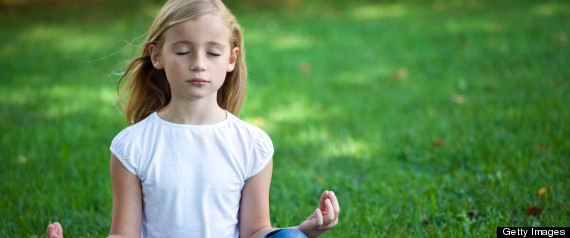
Meditation For Kids: Parents Turn To Mindfulness Practices To Help Children Stay Calm.
More adults turn to mindfulness practices like yoga and meditation to combat mounting stress in their lives. They’re also experimenting with alternative practices to teach their kids to relax. Unfortunately, little ones aren’t immune to the damaging effects of stress. However, they may benefit from stress-relieving practices meant to calm the mind and release physical tension.
Boston dad Andre Kelly tells ABC News that he practices mindfulness meditation with his 10-year-old son every morning before school. Teaching kids mindfulness can go a long way. It can help them boost awareness and control their moods. Kelly has a meditation program for children, Boston Buddha, to bring mindfulness programs into elementary schools.
“The magic moment where they understand mindfulness is when they can catch themselves not paying attention. That’s their chance to control their impulsivity.” “It helps them stop themselves from doing things like jumping on the couch or whacking their younger brother.”
Mindfulness is the focusing awareness on the present moment. Cultivation occurs through a meditation practice. This can help to curb kids’ impulsivity. Research has also shows school mindfulness programs to be effective in reducing symptoms of depression and anxiety among adolescents.
A growing body of research supports the health benefits of mindfulness training. Advocates are hoping to see these programs become more prominent in school curricula. In a 2010 blog, Susan Kaiser Greenland, author of The Mindful Child, argues for nothing short of a “mindful revolution in education.” She states, mindfulness programs can aid kids in developing good habits that will help make them happier and more compassionate.
“Mindfulness is a special process of attention. It allows children to see the world through a lens of attention, balance and compassion,” “When children learn to look at the world with attention, balance and compassion they soon learn to be in the world with attention, balance and compassion.”
However, some parents aren’t completely on board yet. An Ohio elementary school’s mindfulness program was recently shut down due to parent complaints about the practice’s ties to Eastern religions. This week, a lawsuit went to trial over yoga classes at Encinitas Union School District in California. Parents who felt that the schools’ Ashtanga yoga program was inherently religious in nature are suing the school for civil rights violations.
The health benefits of mindfulness meditation for adults are far-reaching. Many of these positive benefits may extend to child practitioners as well. Research connects the practice of cultivating a nonjudgmental awareness of the present moment to lower levels of the stress hormone cortisol. Also, more emotional stability and improved sleep quality, heightened feelings of compassion and greater success achieving weight-loss goals, among a number of other advantages.
The educational benefits of relaxation practices are also significant: Mindfulness meditation can improve focus and increase test scores. A study published this year found that undergraduates who participated in a two-week mindfulness training program demonstrated heightened working memory. Additionally, it showed improved reading-comprehension scores on the GRE.
Some parents have also found that maintaining their own meditation practices can help them to be more patient, compassionate mothers and fathers.
“I take the time to breathe and remember that my goal is to be kind in all of my interactions. This helps me show more patience instead of just getting immediately upset,” mother and CT Working Moms writes on HuffPost Parents. “As a wonderful consequence, I don’t yell anymore.”
Parents interested in practicing meditation with their kids can start with a few basic tips for teaching children mindfulness practices. Ttry a present moment awareness exercise and “belly breathing” relaxation practice.
And for stressed-out kids who have a hard time sitting still and being quiet, physical activity can also have a calming effect. A recent European study found that higher levels of physical activity in children were associated with lower stress reactivity.
By Carolyn Gregoire